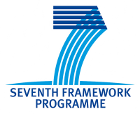Due to the fact that small embedded devices also need a trustworthy hardware component it is necessary to implement the vision of UNIQUE also in a small area. For this reason several challenges appear:
-
Tiny Trusted Modules (TTMs) need to include cryptographic functions at extremely low cost.
-
The TTMs need to be secure against physical tampering and attacks.
-
The designer also needs to trust in the production process as the devices within a TTM are frequently manufactured overseas. As a result, methods to ensure detection of Trojan circuits inserted in the TTM or the detection of overproduction need to be developed.
The development of UNIQUE is partitioned in four technical (WP01-WP04) and two managerial (WP05, WP06) work packages:
- WP01 “Requirements, design and evaluation” focuses on the identification of the threat model(s) and analysis hardware building blocks. It also identifies the security design and evaluation methodologies for hardware anti-tampering and anti-counterfeiting solutions. Security architecture will be developed, defining interfaces between the hardware and software components of the system.
- WP02 “Building blocks” develops Physically Unclonable Functions (PUFs) and combines them with cryptographic primitives. The required cryptographic building blocks are optimised and implemented and also a secure communication channel between digital logic and the PUFs is developed.
- WP03 “Evaluation and validation” has the goal of refining the evaluation methodology for PUFs and hardware Trojans. It tests the prototype PUF implementation developed within WP03.
- WP04 “Prototype” combines the developed PUFs and novel cryptographic primitives and architectures in one demonstrator.
- WP05 “Dissemination” focuses on a coordinated management of dissemination and exploitation for the UNIQUE project in order to enable maximum impact on the European security market.
- WP06 “Project management” aims at an effective operational management with regard to contractual, financial, legal, technical, administrative and ethical management issues.

